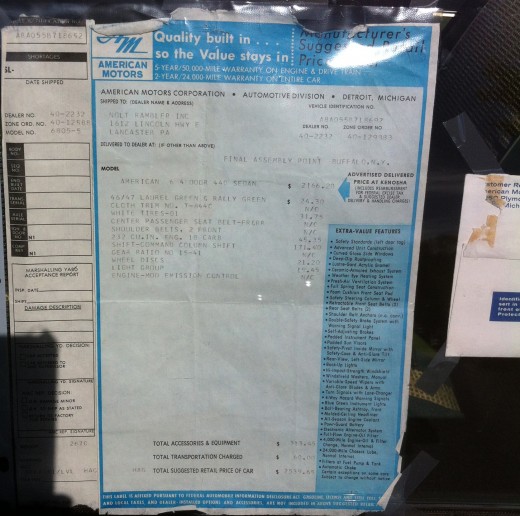MSRP vs. Invoice: New Cars Pricing Knowledge to Become a Smart Negotiator

MSRP vs. Invoice: New Car Pricing
MSRP vs. Invoice: Which one should you pay? You may have heard of MSRP, the invoice price, the sticker price and TMV but do you know what exactly do they mean to you and how important they are for any new car buyer? In a nutshell, they are the new car pricing terms that you should know for the specific car you are interested in buying. Without that knowledge, you will most likely end up overpaying because it's like getting into a battle blindly.
Nowadays, one of the most important aspects of buying a new car, is knowing MSRP, Invoice price and TMV (True Market Value). If you are confused as to which one to pay; MSRP or Invoice, the answer is none of them. Despite the importance of knowing both of them, the most important figure you should know is the market value.
The car sales industry has its own language and acronyms. Understanding or at least having a basic idea about that language and acronyms along with a few hours of research on your part, will considerably increase your ability of getting a great deal without getting ripped off. In a nutshell, it's knowledge all you need because when we know what we are going to do, we will be in a better position and we can use our own leverage to control and lay out our own pre-prepared deal.
The knowledge that you need to take the mystery out of the car pricing idioms, is available and easy to get thanks to the existence of the internet. Nowadays, most people head over to the online websites to save time and money. Websites such as Edmunds.com, Kelly Blue Book, New Car Price Report - Consumer Reports Onlineand CarsDirect, can drastically help you to get car prices and price quotes that are crucial for negotiating a great deal.
MSRP vs. Invoice vs. Other Important Pricing Terms
Despite MSRP and Invoice price are two of the most important car pricing terms that you should know, you may end up paying a different value.
Here are the possibilities that may occur when you pay for the new car that you are interested in buying:
- You pay MSRP or sticker price.
- You pay above MSRP or sticker price.
- You pay below MSRP or sticker price and above the Invoice price.
- You pay TMV or fair purchase value.
- You pay the invoice price.
- You pay below the invoice price.
Bear in mind that the value that you pay will depend upon many different factors such as the popularity of the car, the region it is sold in, the demand and supply, the options, the manufacturer-to-dealer incentives, the dealer rebates, the consumer incentives/cashback and above all your ability to negotiate for a great deal.
In fact, considering all those different factors, the process of getting a great deal is a daunting task. However, if you do your homework and the required research beforehand, you will be the decision maker and you will be decreasing the odds of being taken for a ride. It's that simple, know what you want and know what you expect to pay and you will be the winner.
Let's look at the definition of each term, so we can get a clear idea about the car pricing system and how to use it to our advantage when negotiating for a new car so we can get a great deal.
MSRP: MSRP stands for the Manufacturer's Suggested Retail Price. The meaning is clear here because MSRP is just the suggested retail price that the manufacturer or automaker suggests for the car to be sold for. MSRP includes the standard equipment and any factory-installed options. In fact, the manufacturer cannot set a fixed price for the new car they just suggest a price so that the dealership can sell the car at that suggested price or above or below.
The manufacturer or automaker suggests that price based on many factors such as the cost of manufacturing, the make and model, the standard equipments and potentially where the car is being sold. MSRP is listed on the sticker on the window of the new cars. By law, all new cars for sale are required to list the MSRP on the sticker in the window and the buyer is the only one who has the right to remove the sticker off the window.
Since the MSRP is just a suggested price, the dealer finds himself free to charge whatever he wants when selling the new vehicle. Also, the manufacturers and dealers sometimes jack up the MSRP or the sticker price artificially and afterwards grant a discount and incentives to lure customers to purchase the new vehicles.
Sticker Price: Most people consider MSRP and sticker price the same thing due to the fact that both are referred to as the price that is listed on the sticker on the windows of the new cars. That may be true, however MSRP is the retail price that the manufacturer suggest that the dealer charge for the car when sold.
The sticker price is the most visible number on the new car's window sticker. It is also the price cited in TV and newspapers in car advertisements. Bear in mind that the dealers would like you to pay this price. On the other hand, you should know the invoice price and any incentives and Holdbacks to start your negotiation.
MSRP is like a base price but the sticker price consists of MSRP plus the additional fees that the dealership charge the customer when buying the new car such as transportation (destination charge), preparation costs and dealer or aftermarket installed options. These additional fees are not part of the initial MSRP but are part of the final cost of the new car. The sticker price is what the dealership lists as the price for sale.
Some cars are sold over-sticker price because the market demand of those cars is higher than the supply.
Invoice Price: The invoice price is the figure that denotes the money that the dealer has paid to the manufacturer or the automaker. Manufacturers ship cars with invoices which are the bills from the manufacturer to the dealer for each car. However, what the dealer has really paid may be less than the invoice price because there are some incentives, rebates and holdback from the manufacturer to the dealer that reduce the total amount of money the dealer pays for the new car. Therefore, after deducting the amount of the rebates, incentives or holdback from the invoice price, anything over that will be the dealer's profit.
TMV: TMV (True Market Value) is a value represents the true market value of the car that you are interested in buying. It's a value you can find at Edmunds.com. The Edmunds.com has created this value to give you a rough idea about how popular the car and how much you could expect to pay for it. The analysts of Edmunds.com look at the market to examine what different cars are sold for in your area. Considering the popularity of the car, they set the TMV price. Since the TMV is an average amount that other buyers in your area are paying for the car, you can expect to pay the exact TMV, more or less.
Where to Find the Different Car Prices?
You can find the different new car prices at the following websites:
- Edmunds.com.
- Cars.com.
- CarsDirect.
- Consumer Reports: New Cars Price Reports.
- NADAguides.
- NewCars.com.
Cars that are sold over-sticker
Some cars are typically sold over-sticker price when:
- They are just being launched to the market such as the Mazda Miata, Honda Odyssey and Chevrolet PT Cruiser.
- The demand of those cars is higher than their supply such as Mazda rx8.
The Factors That Determine the Price of the New Car
- The popularity of the vehicle.
- Dealer invoice price.
- Options.
- Dealer prep.
- Dealership add-ons. Sometimes you'll see a second window sticker.
- Dealer incentives. Also called "manufacturer-to-dealer incentives" or "direct-to-dealer incentives.".
- Customer rebates/cashback/buyer incentives.

Some Tips to Help You Get a Great Deal
- The dealer will most likely direct your attention to the official-looking Sticker Price, but you on the other hand should know the invoice price and any incentives, rebates or holdback to start your negotiation. Also, you should know the TMV of the car because that will most likely be the market price that you will pay or pay near value.
- Cars that is just being launched to the market will most likely be sold at Sticker Price or over-Sticker Price. Therefore it's better to buy the model late in the year before new models show up to the market.
- You can tell the dealer that you will pay X amount of dollars over the invoice price.
- Recently, dealers have become more open to show customers the invoice price, but it's better to demand to see it politely.
- The higher the dealer or the salesperson starts negotiations, the more he is willing to reduce the price. While he is making the MSRP or the Sticker Price his starting point, you should contrarily make the Invoice Price your starting point. Work up from there while keeping eye on TMV as being where you want to wind up.
- As the market is always changing so do the prices, it's always better to shop around for the best deal. Make your research timely.
- Buy the new car at the end of the month as the dealerships have sales quotas, so you can get a relatively good price.
- Buy out-of-season cars like when you buy a convertible in the winter.
At Last
As you can see, knowing the numbers behind the deal will be the essential difference between the educated buyer and the uneducated one. Therefore, to be the smart negotiator that gets the best deal, you should research and do your homework beforehand.
I hope that you have found this article helpful and if you have any additional advice or opinion, feel free to leave a comment.
Muhammed F Omran wrote this article about MSRP and Invoice price.
For the latest, strategic, to the point and actionable car buying tips, go to http://muhammedfomran.hubpages.com/ so that you can easily find all the sections and pages of this website.





